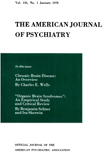THE PSYCHIATRIC MANPOWER OF NEW JERSEY
Abstract
1. New Jersey, a state with a population of 4¼ million, has about 5,000 physicians; of these 262 are doing psychiatry, either fulltime or part-time, in institutions or in private practice.
2. Of the 262 physicians doing psychiatry in New Jersey, 75 are board diplomates; 101 additional doctors are members of a recognized psychiatric association; and there are 73 physicians doing psychiatry in hospitals, clinics, or other agencies, who are neither diplomates nor society members. The remaining 13 physicians devote much of their office time to psychiatry but do not have hospital, board, or society recognition in the specialty.
3. Of the 262 physicians doing psychiatry in New Jersey, 112 are in private practice; of these, all but 13 devote their full professional time to the specialty. Ninety-three (of the 262 psychiatrists) are employed by state or county hospitals or clinics and 45 by the Veterans Administration.
4. In addition to the 112 doctors in private practice, there are 35 others who, though engaged in institutional work, do accept private patients so that, in all, some 147 psychiatrists of varying grade are privately available to the people of New Jersey.
5. Of the 147 psychiatrists available to private patients, 40 are Board diplomates, and 66 others belong to recognized psychiatric associations.
6. Of private practitioners, 32% are Board diplomates; of Veterans Administration psychiatrists, 29% are Board diplomates. For psychiatrists in state hospitals, the figure is 27%.
7. Of the 75 Board diplomates in New Jersey, about one-half (actually 36) are primarily engaged in private practice, while the other half (actually 39) are in hospital, agency, or institutional practice.
8. Some 2.1% of all New Jersey physicians belong to the American Psychiatric Association. The national figure is 2.2%. The states nearest to New Jersey in population are Michigan, Missouri, North Carolina, and Massachusetts. In Massachusetts 3.0% of physicians belong to the A. P. A. but in the other states the figure is the same as (or lower than) that in New Jersey.
9. Using as an index the number of Board diplomates per thousand physicians, the ratio nationally is 14; in New Jersey it is 13, in Missouri 8, in North Carolina 1, and in Massachusetts 26.
10. Psychiatrists are available for private consultation in every county of New Jersey except the 4 smallest. Each of these 4 counties (Salem, Ocean, Hunterdon, Cape May) is adjacent to a county in which private psychiatrists are available.
11. Private psychiatrists are available at a ratio of 29,000 persons per practitioner, which is considered an average though not an ideal figure. In terms of referring physicians, the state has 31 privately available psychiatrists per thousand physicians, which is also an average figure.
Access content
To read the fulltext, please use one of the options below to sign in or purchase access.- Personal login
- Institutional Login
- Sign in via OpenAthens
- Register for access
-
Please login/register if you wish to pair your device and check access availability.
Not a subscriber?
PsychiatryOnline subscription options offer access to the DSM-5 library, books, journals, CME, and patient resources. This all-in-one virtual library provides psychiatrists and mental health professionals with key resources for diagnosis, treatment, research, and professional development.
Need more help? PsychiatryOnline Customer Service may be reached by emailing [email protected] or by calling 800-368-5777 (in the U.S.) or 703-907-7322 (outside the U.S.).



